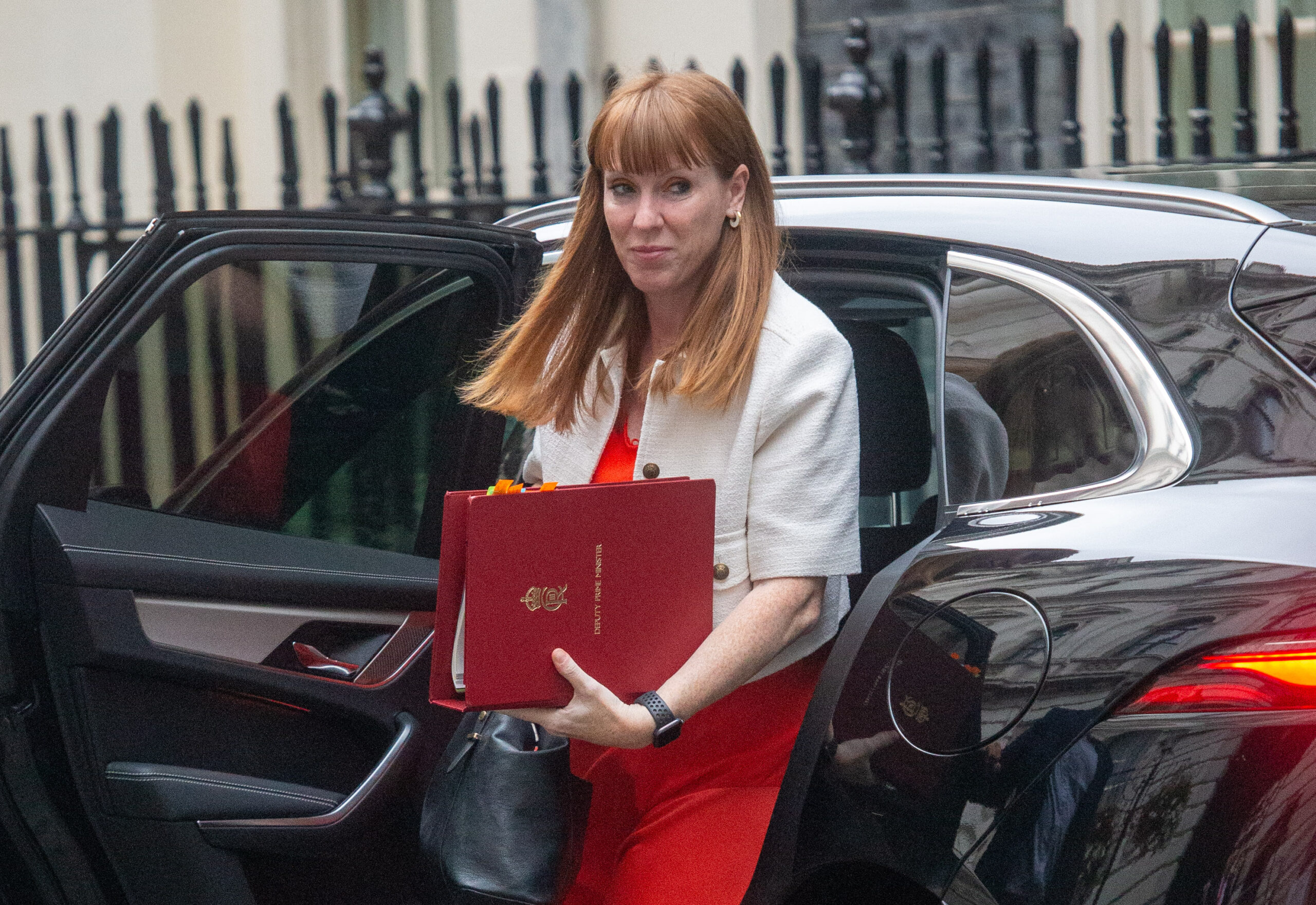Angela Rayner Was Labour’s Designated Defender of Workers’ Rights. Now She’s Gone, Big Business Is Swooping In
‘We’re fucked.’
by Polly Smythe
9 September 2025

Asked about the future of the employment rights bill following the departure from cabinet of one of its key champions, former deputy prime minister Angela Rayner, a general secretary of a UK trade union told me: “We’re fucked.”
The general secretary’s comment reflected the anxious mood of the Trade Union Congress (TUC) – the gathering of roughly 600 delegates from around 48 trade unions, where we spoke, and which this year is dominated by concerns over the future of Labour’s flagship legislation to improve the lot of workers.
Labour has described its employment rights bill as the “biggest levelling-up of workers’ rights in a generation”. Among other things, it would end zero-hours contracts; give all workers more rights from day one (including parental leave); introduce statutory bereavement leave; ban fire-and-rehire practices; and repeal anti-trade union laws.
Businesses, who’ve long been hostile to the bill, have seized on the reshuffle as a fresh opportunity to push for dilution of the legislation. In response, union leaders have warned Labour that any attempt to water down the legislation would put the movement on a collision course with the government.
Keir Starmer’s sweeping reshuffle on Saturday saw not only the departure of Rayner, who resigned over her underpayment of stamp duty, but also the removal of another key proponent of the bill, the employment rights minister Justin Madders. Business secretary Jonathan Reynolds, who had a broadly good working relationship with the unions, has also been moved to chief whip, a job that will give him much less interface with trade unions.
Speaking at a fringe event on Monday evening, Madders said: “We’ve already heard comments from some of the business groups that they see this as an opportunity to row back on elements of the bill.
“There’s no doubt there are people waiting and trying, quite heavily, to take the opportunity of mine and Angela’s departure to change some of the scope of the bill and the regulations.”
Asked if Starmer removed him as a sop to the business community, Madders said: “I haven’t been given a reason for my removal. You’ll have to ask those who made that decision. People will draw their own conclusions.”
Replacing Madders is Halifax MP Kate Dearden, with Peter Kyle taking over from Reynolds. While the appointment of Dearden, who worked for trade union Community as head of research before the 2024 election, has been generally welcomed by the trade union movement, Kyle’s has prompted concern.
Kyle, a Blairite and close Starmer ally, has been criticised for being too close to the tech industry: earlier this year, a Lib Dem MP accused him of “rubbing shoulders with […] big US tech bros”.
The employment rights bill will return to the Commons this week for MPs to consider amendments made to it in the Lords, which include reducing the qualifying period for unfair dismissal from two years to six months (the government’s manifesto promises the right to challenge unfair dismissal from day one), and alowing employers to cancel shifts without pay with more than 48 hours’ notice (the Commons had previously simply said “short notice”). Downing Street has publicly committed to reversing all of the Lords’ amendments.
However, it isn’t at this stage that union leaders believe the bill to be vulnerable. The work of determining the exact details of the bill has been left to secondary legislation, much of which will be subject to consultation from business.
In particular, unions have expressed concern about the future of the ban on “exploitative” zero-hours contracts and ending fire and rehire, both of which are highly technical.
Concern has also been raised over the future of worker status reforms, which Rayner battled hard to protect, and on which the success of the entire bill rests. At the moment, the UK has a three-tier employment status system: employed, self-employed and a third category called limb (b).
These limb (b) workers work for a company, often in the gig economy, but are not its employees, giving them core statutory rights but not the full employment rights that employees have. The complexity of the system can be exploited by bosses, who purposefully misclassify workers so as to prevent them from enjoying basic employment rights, such as sick pay and the right to challenge unfair dismissal.
While Labour initially pledged to “move towards a single status of worker”, that pledge has since been dropped in exchange for a consultation on creating a simpler two-tier employment framework. Academics and unions have expressed concern that companies will try to get around any new employment protections by hiring workers as self-employed.
“There are going to be about 80-plus statutory instruments implementing this bill over the next few years,” said Madders at the TUC fringe event. “That’s 80-plus opportunities for the business community to try and get some of this rowed back on … How much evidential burden there is, how many consultations there need to be, how many meetings, what processes need to be followed?”
Asked if worker status was at risk of further dilution following his removal, Madders told Novara Media, “Definitely.”
Addressing congress on Tuesday, TUC general secretary Paul Nowak urged Labour to implement the bill “in full”.
Meanwhile, Unite general secretary Sharom Graham told the BBC that she hoped that Labour “don’t intend on now slowing this down or indeed scrapping some parts of it altogether.” Even Unison’s general secretary, Christina McAnea, one of Starmer’s closest allies, said the reshuffle was “very worrying” and pledged to “do everything we can to make sure this is not watered down”.
A focus on securing passage of the employment rights bill has been largely responsible for keeping the peace between Labour and unions during Starmer’s rightwards drift. As the Labour government has faced challenges from both left and right, unions have remained notably quiet, refraining from public criticism in part to give the bill its best chance.
Having held up their end of the bargain, unions now face the possibility that Labour won’t hold up its own. It’s not clear yet how unions would respond to any further backtracking – whether individually or as a bloc.
Unions don’t always operate as a singular political force, instead pushing for their own sectoral issues, which means that any response to softening would depend on which part of the bill was weakened.
But union leaders might be reluctant to admit that they’d been let down by Labour, fearing embarrassing themselves before their members, many of whom already accuse their unions of being reflexively supportive of the party.
That’s particularly relevant given that the general secretary post of the “big three” unions – Unison, GMB and Unite – are soon up for election, increasing the likelihood of the incumbents distancing themselves from Labour in an effort to play to their base and not be outflanked by new candidates.
Andrea Egan, standing against McAnea to run Unison, has accused the union of adopting a “subservient approach” to Labour, and called for a comprehensive review of the union’s relationship to the party.
Polly Smythe is Novara Media’s labour movement correspondent.


